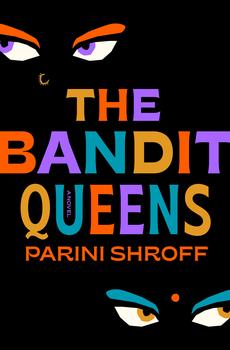Book Club Discussion Questions
In a book club? Subscribe to our Book Club Newsletter!
For supplemental discussion material see our Beyond the Book article, Phoolan Devi: The Real-Life "Bandit Queen" and our BookBrowse Review of The Bandit Queens.
Please be aware that this discussion guide will contain spoilers!
- At the very beginning of the novel, we learn that Geeta feels ostracized and isolated by her village because of the rumors surrounding her husband's disappearance. What did you think of the "small-town" politics at play and how they affected Geeta's life in the five years before the novel opens? How do you think those same politics continued to affect Geeta and the other women over the course of the novel?
- When Farah comes to Geeta and asks for her help in doing away with Samir the same way she supposedly rid herself of Ramesh, Geeta realizes that the reputation she's leaned on to help build her new life has now become a double-edged sword. What do you think you would have done if you were placed in Geeta's position?
- One of the things that makes the strong female characters in The Bandit Queens so relatable is that they are flawed. For example—at first, Geeta is too proud to ask for help when Farah begins to blackmail her, and we see her eventually have to swallow that pride and go to Saloni for assistance. What other flaws made the characters feel more relatable as you were reading?
- When Saloni does find an answer to Geeta's problem, it's certainly not the kind Geeta was hoping for! What did you think of Saloni's solution and of Priya and Preity joining the fray?
- As the women come to Geeta asking for her help, we understand that our "would-be widows" are equating being widowed with being free, and that they seem to be inspired by Geeta's freedom to live her life as she chooses and not at the dictates of a husband. Would you equate these two things in the same way? Do you think their particular circumstances are shaping this idea of freedom for them? Why or why not?
- Throughout the novel, we see that several of our female characters feel that violence is the only means left to them by which they can improve their circumstances. What do you think of that idea—do you think violence can ever be justified? Are there any other solutions that you can see for them?
- While we see several female characters choose violence, we also see a number of male characters choose (or threaten) the same—Samir, Ramesh, and Bada-Bhai, especially. What difference do you feel it makes, if any, when violence is being perpetrated by male characters versus female characters? What factors do you think contribute to why we perceive violence differently depending on who is committing the act?
- The author explores a number of serious topics in the novel—patriarchal societies and the caste system among them. Did reading The Bandit Queens cause you to look at these (or any other) social institutions in a new way?
- What is unique about this novel is how the author uses humor to explore and give nuance to these and other serious topics; what did you think of the author's choice to do so? What effect did it have on you as you were reading? Did it cause you to think about those topics in any new ways?
- Over the course of the novel, we see Geeta learn to open herself up to new experiences, to rekindling friendships, and even to new love. What did you think of her journey as a character? Were you rooting for her all along the way?
- Female friendship is one of the central themes of The Bandit Queens, and towards the end of the novel, we see the phrase "be a bonobo" become a touchstone for this idea. What did you think of the lessons the women learned as they banded together to protect each other? Are there any female friendships in your life that you think exemplify the idea of "being a bonobo"?
- Were you familiar with India's Bandit Queen before reading the novel? After reading about her in the novel, what was your reaction to this individual's life?
- What do you think the future has in store for Geeta and the book's other characters? How do you see their lives progressing?
- Karem tells Geeta that love isn't a feeling, it's a commitment – a "choice you renew every day." What do you think of this? Do you agree with him?
- Karem tells Geeta "Sometimes to do the right thing, you have to do the wrong one first." What do you think he means? Do you feel he's correct in his assessment? If so, can you think of other examples where this might be true?
- Saloni believes the women can literally get away with murder because they're middle-aged housewives. "Who's more invisible than us?" she asks Geeta. Do you think the women are invisible to others in their society? Do you think this is the same or different in your own culture?
- The culture portrayed in the book is rife with injustices. What injustices do you see in your own culture? How does one level the playing field? In your opinion, is there an effective way pursue justice for all in your own society?
This discussion guide was provided by Ballentine Books and reprinted with their permission, augmented with questions from BookBrowse's editorial team.
Unless otherwise stated, this discussion guide is reprinted with the permission of Ballantine Books.
Any page references refer to a USA edition of the book, usually the trade paperback version, and may vary in other editions.
